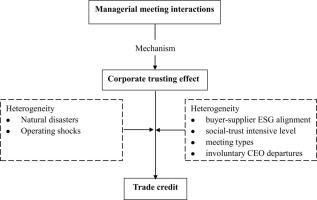建立信任的面对面互动:来自供应链融资的证据
IF 6.9
2区 经济学
Q1 BUSINESS, FINANCE
Research in International Business and Finance
Pub Date : 2025-08-01
DOI:10.1016/j.ribaf.2025.103156
引用次数: 0
摘要
突破信任壁垒是中国企业克服融资约束的关键。本文探讨了在投资者会议期间寻求与外界更直接互动的经理如何影响公司获得贸易信贷的机会。研究结果表明,管理者与投资者之间的互动与贸易信贷的提供之间存在正相关关系。这种效应在社会信任强度较低、买家与供应商ESG一致性较高、以及线下会议较多的公司中更为明显,但在非自愿解雇CEO的公司中则消失。会议互动产生的信任激励效应进一步体现在,遭受冲击的企业即使在经历了自然灾害和财务错报之后,信任效应仍然存在。这种关联对几种检验是稳健的,包括类似的替代解释和利用汽车驾驶距离和访问企业总部与机构访客总部之间的旅行时间的两阶段工具回归。本文章由计算机程序翻译,如有差异,请以英文原文为准。

In person interaction to build trust: Evidence from supply chain financing
Breaking through trust barriers is the key for Chinese enterprises to overcome financing constraints. This paper explores how managers seeking more direct interactions with outsiders during investor conferences affect a firm’s access to trade credit. The results demonstrate a positive relationship between manager-investor interactions and the provision of trade credit. This effect is more pronounced in companies with a low-intensive social trust region, higher buyer-supplier ESG alignment, and offline meetings, but disappears in companies with involuntary CEO dismissals. The trust-motivating efficacy derived from conference interactions is further mirrored by the fact that the shock-hit enterprises’ trust effect persists even after experiencing natural disasters and financial misstatements. This association is robust to several checks, including analogous alternative explanations and a two-stage instrumental regression utilizing the car-driving distance and the travel time between the headquarter of a firm visited and the headquarter of institutional visitors.
求助全文
通过发布文献求助,成功后即可免费获取论文全文。
去求助
来源期刊

Research in International Business and Finance
BUSINESS, FINANCE-
CiteScore
11.20
自引率
9.20%
发文量
240
期刊介绍:
Research in International Business and Finance (RIBAF) seeks to consolidate its position as a premier scholarly vehicle of academic finance. The Journal publishes high quality, insightful, well-written papers that explore current and new issues in international finance. Papers that foster dialogue, innovation, and intellectual risk-taking in financial studies; as well as shed light on the interaction between finance and broader societal concerns are particularly appreciated. The Journal welcomes submissions that seek to expand the boundaries of academic finance and otherwise challenge the discipline. Papers studying finance using a variety of methodologies; as well as interdisciplinary studies will be considered for publication. Papers that examine topical issues using extensive international data sets are welcome. Single-country studies can also be considered for publication provided that they develop novel methodological and theoretical approaches or fall within the Journal''s priority themes. It is especially important that single-country studies communicate to the reader why the particular chosen country is especially relevant to the issue being investigated. [...] The scope of topics that are most interesting to RIBAF readers include the following: -Financial markets and institutions -Financial practices and sustainability -The impact of national culture on finance -The impact of formal and informal institutions on finance -Privatizations, public financing, and nonprofit issues in finance -Interdisciplinary financial studies -Finance and international development -International financial crises and regulation -Financialization studies -International financial integration and architecture -Behavioral aspects in finance -Consumer finance -Methodologies and conceptualization issues related to finance
 求助内容:
求助内容: 应助结果提醒方式:
应助结果提醒方式:


